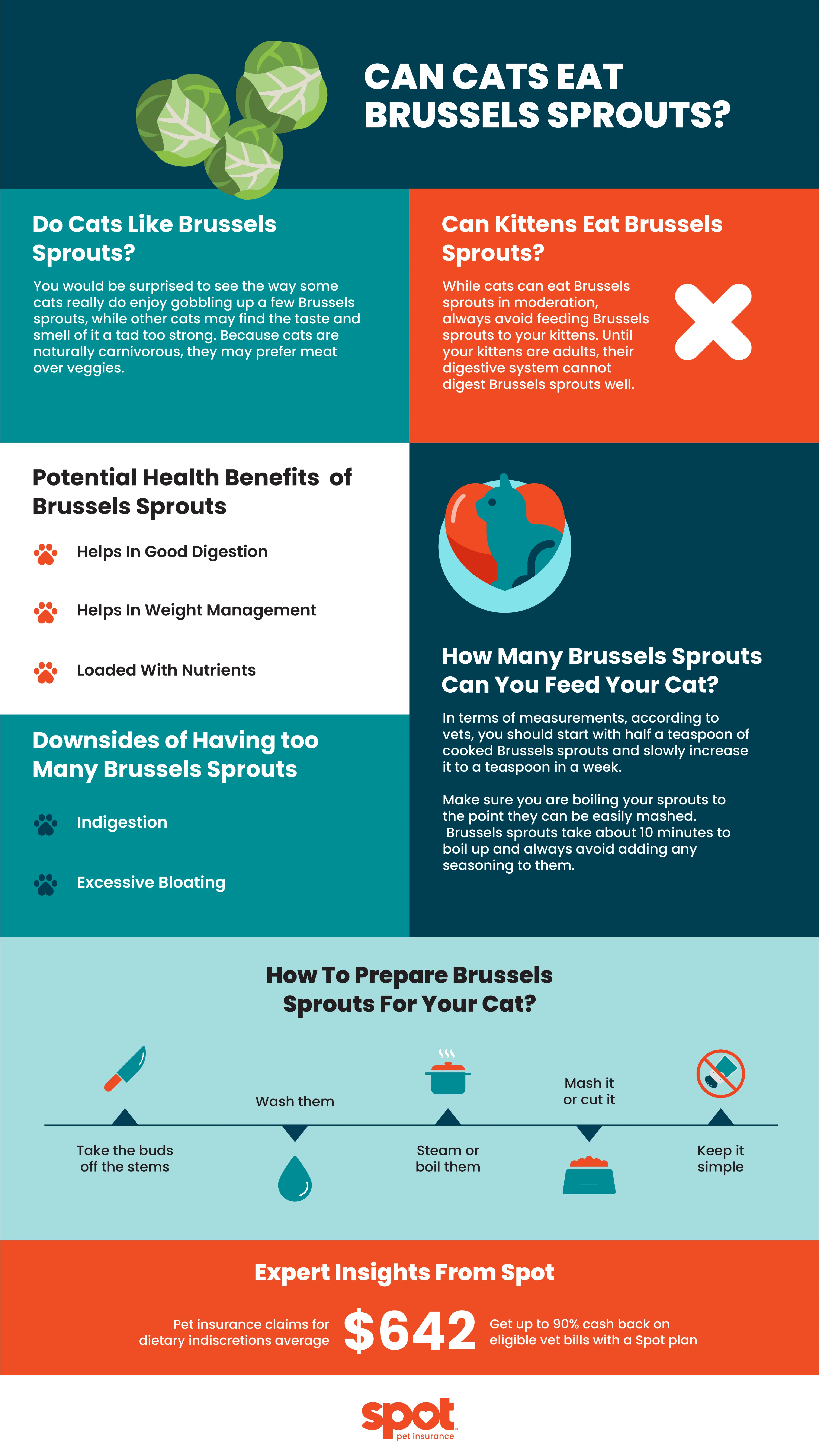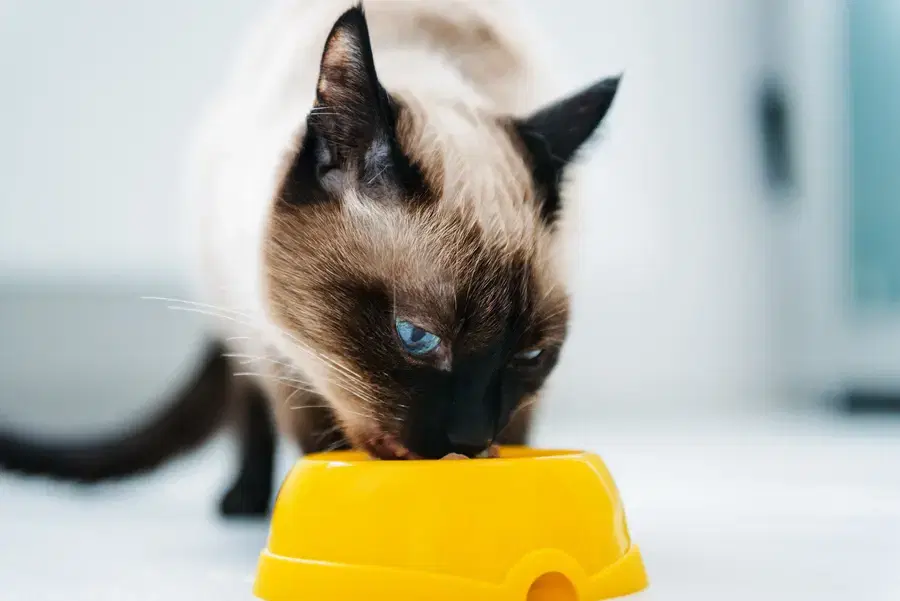If you like to munch on a veggie, you definitely may feel like sneaking some to your little furry friend. When it comes to vegetables, you may feel like your cat needs the extra nutrients we humans normally get. And that's true with many vegetables that cats can eat. One of the common veggies a cat parent may wonder about is Brussels sprouts. But can cats eat Brussels sprouts? Yes, cats can eat Brussels sprouts in moderation.

Do Cats Like Brussels Sprouts?
Whether cats like Brussels sprouts or not can depend on the cat’s everyday diet and food choices. You would be surprised to see the way some cats really do enjoy gobbling up a few Brussels sprouts, while other cats may find the taste and smell of it a tad too strong. If your cat doesn’t like cabbage, there is a high chance they may not enjoy Brussels sprouts either. Because cats are naturally carnivorous, they may prefer meat over veggies, but if your cat does enjoy veggies, you should learn more about whether cats can eat Brussels sprouts and if they are good for their overall health.
Are Brussels Sprouts Good for Cats?
Cats are reliant on meat for their nutrition which is why they may not need Brussels sprouts for their nutrients, but some benefits may help your cat’s overall health. Below are a few potential health benefits Brussels sprouts can give to cats.1
Helps In Good Digestion:
Packed with soluble and insoluble fiber, Brussels sprouts can be quite helpful in digestion for cats. Soluble fibers help in water absorption and create easy stool passage. Whereas, insoluble fiber helps intestinal motion, which prevents constipation. Fiber helps in preventing and easing diarrhea as well.
Helps In Weight Management:
Brussels sprouts are mainly made of water and fiber. This helps your cat feel fuller for a longer period of time, which can assist in weight management. While you shouldn’t switch Brussels sprouts with meat or animal protein, it can be a good additive. Especially if you are looking to shed a few kilos off your cat.
Loaded With Nutrients:
Filled with the goodness of vitamins, minerals, and other nutrients Brussels sprouts can help your cat recover from some chronic diseases like cholesterol and heart disease. Below are some nutrients found in Brussels sprouts and their benefits for your cat.
Vitamin A: Improves vision
Vitamin K: Lowers blood pressure and speeds up the healing process
Omega-3: Stabilizes blood sugar in diabetes
Vitamin C: Promotes the immune system
How Much Brussels Sprouts Can You Feed Your Cat?
With any kind of new food you introduce your cat to, it is important to start slow. Giving a very small amount of the food until you're sure your cat isn’t showing any signs of allergy is a good practice. When you are feeding Brussels sprouts to your cat, always feed a small quantity; an excess of Brussels sprouts can cause discomfort or upset their stomach.
In terms of measurements, you should start with a very small amount any time you introduce a new food to your cat's diet to see how they react.1
Make sure you are boiling your sprouts to the point they can be easily mashed. If you are just sauteing them up, always cut them in little bite sizes. Brussels sprouts take about 10 minutes to boil up and always avoid adding any seasoning to them.2
Steer clear of feeding your cats raw Brussels sprouts as it may cause intestinal discomfort.
Can Kittens Eat Brussels Sprouts?
While cats can eat Brussels sprouts in moderation, always avoid feeding Brussels sprouts to your kittens. Until your kittens are adults, their digestive system cannot digest Brussels sprouts well.
How To Prepare Brussels Sprouts For Your Cat?
Start by taking the buds off the stems with a sharp knife and washing them with cool water. Once done, you may either steam or boil the Brussels sprouts till they are soft.
Now you can either mash it or cut it into small bit size pieces and avoid any kind of seasoning. This may be dangerous for their digestion.
Look for signs of allergy if it is your first time feeding your cat some Brussels sprouts.
What Can Happen if Your Cat Eats an Unusual Amount of Brussels Sprouts?
While there may be some benefits of Brussels sprouts for cats, below are some potential downsides of having too many Brussels sprouts.2
Indigestion:
Because cats have a delicate digestive system, they may experience gastrointestinal discomfort with sudden dietary changes. This may also result in vomits and diarrhea. If you introduce Brussels sprouts into their diet abruptly, it may cause them stomach aches too.
Excessive Bloating:
Just like humans, cats can experience discomfort and gaseousness after eating Brussels sprouts. If your cat is bloated, avoid feeding them Brussels sprouts and schedule a visit to your vet for an exam.
Expert Insights From Spot
While sharing our favorite foods with our pets can be tempting, it's important to remember that not all human foods are safe for cats. Spot's internal data shows that pet insurance claims for dietary indiscretions average $642*, highlighting the importance of caution and research before sharing snacks with your pet.
Alternative Vegetables for Cats:
If you think your cat is allergic to Brussels sprouts, consult a vet. Some signs to check out are vomiting, itching, and swelling.
If you want to feed your cat some veggies and you aren’t sure if Brussels sprouts are the right choice, or if your cat doesn’t fancy its taste, here are some alternate options they might love and enjoy.
Cooked Pumpkin: with equally high fiber content, cooked pumpkins are a yummier alternative for your cats.
Broccoli: Cook your broccoli florets and cool them up before feeding them to your cats. They may end up liking their new treat. But always avoid seasoning them with salt or onion and garlic.
Mashed Carrots: your cats will truly benefit from the vitamins and minerals from the cooked carrots. As they are hard to chew on, it is best to cook and mash them up.
Whatever kind of veggies you wish to introduce to your cat’s diet, always make sure to keep an eye on whether they enjoy eating them.
How Spot Pet Insurance Can Help
We know that cats can be mischievous when they want to be and can end up getting in trouble. Our cat insurance plans can help cover unexpected medical conditions with up to 90% cash back on eligible vet bills and access to a 24/7 Pet Telehealth helpline so that you can always have someone by your side to help guide you through questions you may have about your pet’s health or behavior.
Conclusion:
Even though cats can eat Brussels sprouts, they do not necessarily need it to be a part of their everyday diet. Some cats may like mashed Brussels sprouts, some may not like it at all. In both cases, you should always talk to your vet before introducing new foods to your cat’s diet.
With veggies, your cats should be well-fed with all kinds of nutrients and proteins. While an occasional treat is good, don't rely on them for any kind of nourishment. And should you seek advice, always consult a vet you trust.

The resident animal enthusiast at Spot. I have a lifetime of pet parent experience. If it has fur, feathers, or scales, I’ve probably shared my home with it. I aim to be a reliable source, blending experience with a dedication to the well-being of pets.
*Jan 2019 to Aug 2024 Spot Pet Insurance Services, LLC claims data.
Layne, Misty. "Can Cats Eat Brussels Sprouts?" Hepper, 11 Apr. 2025, https://articles.hepper.com/can-cats-eat-brussels-sprouts/.
"Can Cats Eat Brussels Sprouts?" Cats Quest, 06 Jun. 2024, https://catsquest.com/can-cats-eat-brussels-sprouts-heres-what-you-need-to-know/.
The information presented in this article is for educational and informational purposes only and does not constitute or substitute for the advice of your veterinarian.












